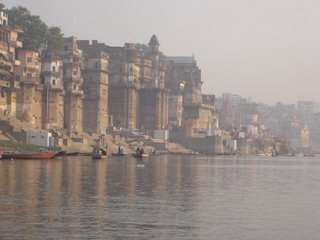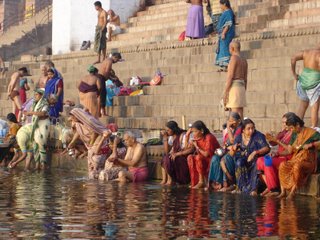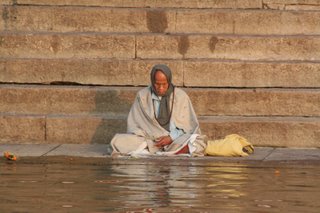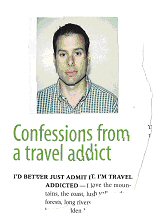Life and Death on the River
 How do we search the Milkyway for signs of life? We send probes deep into space landing on planets, meteors and sample space dust looking for the presence of water elements. Water being one of the primary, if not the primary, source of life on earth, it should come as little surprise that water can be found in most areas inhabited by humans. I say “most” because anyone who has been to Las Vegas knows, it is the flow of money not water that started that desert metropolis (reluctant to use the obvious desert cliche “oasis”). But before PVC pipe and the Roman aqueduct, there was one surefire way to ensure that you had access to water, live on it or next to it. Varanasi, India, also referred to as Benares, is just such a city, hugging the banks of the Ganges.
How do we search the Milkyway for signs of life? We send probes deep into space landing on planets, meteors and sample space dust looking for the presence of water elements. Water being one of the primary, if not the primary, source of life on earth, it should come as little surprise that water can be found in most areas inhabited by humans. I say “most” because anyone who has been to Las Vegas knows, it is the flow of money not water that started that desert metropolis (reluctant to use the obvious desert cliche “oasis”). But before PVC pipe and the Roman aqueduct, there was one surefire way to ensure that you had access to water, live on it or next to it. Varanasi, India, also referred to as Benares, is just such a city, hugging the banks of the Ganges.
The Ganges is the way of life for the cities residents. It is a source for drinking, bathing, washing and even dying. Hindus from all over the country come to bathe in the river, a ritual they believe washes away their sins. And because of its location on the river banks, Varanasi is an auspicious place to die. For the dead whose relatives can afford the 3,000 rupee cremation charge, they can be cremated on the banks of the river placed upon quarts of wood. Those who cannot afford the steep charge can still be cremated on the banks for a mere 500 rupees, but the cremation is carried out by an electric oven. Still for others, babies, young boys, priests and those killed by a cobra bite, cremation is not an option. Their body is sent down the river in an as is condition.
Awaking at 5:00 a.m. for our 5:30 departure to the pre-dawn Ganges boat ride, the thought of seeing death was not topping my list of “to-dos”, but this was India, and seeing death is more a part of daily life than in the west. About twenty minutes before sunrise, we boarded the white paint chipped wooden boat as one man rowed to the middle of the river. Already buzzing with activity, chanting over loud speakers, bells ringing and people bathing, praying and meditating, the river carried our boat quietly down stream in the early morning haze.
What we were doing up at this ungodly hour? What was I really here to see? What were we all (mostly westerners) here to see? Was it life along the banks of the river? Or was it death? I believe it is the latter. Not quite sure why that is, but could it be that the Western lifestyle is not confronted with death on a daily basis as in India. Or perhaps it is because our culture is more life affirming and therefore we spend little time thinking about death contrary to the daily religious and spiritual routines carried out by the Muslims and Hindus across the nation. Does their faith keep them closer to death (the concept of death)? Or is it that we are intrigued by death because most of the time our experience of it is on television and not on the streets in front of our homes as occurs here by the minute?
Speaking with Roopa about death before I left Bombay, she explained that for Hindus who can afford it, after a loved one dies, the family will bring the body home. For three days, family members and friends will visit, they will bathe the body, put flowers on it and say prayers. Can you imagine doing this in your home, “Um, pass the washcloth, grandpa is starting to get ripe” or “stop at the store, I need to get some flowers for my dead great aunt.” My faith in something greater than me is strong, but I’m going to pass on the three day bathing the dead ceremonies.
My reaction is probably not much different from those reading this, but floating along the banks of the Ganges, one has the opportunity to reconsider. Just before 6:30, the bright orange sun rose over the horizon. Once again, as sunrises often do, it filled me with joy as the possibilities of the day lay ahead. It was the birth of a new day and for some, it was the day to move on to the next stage beyond their bodily form. Two bodies lay on the ghat steps, wrapped in colorful fabrics, meaning that they were women, as men were customarily wrapped in white. The smoke spiraled to the newly lit sky as three men prepared the fire to receive the body wrapped in a gold foil like material.
From a distance observing the preparations felt safe, but there was no changing the channel. Irony struck as I thought to myself, “it took the chance to observe a death ritual to get me out of bed before sunrise.” Might seem slightly off, but I was not alone. There were three or four crowded boats of camera ready Western and Japanese tourists in attendance for the same reason.
Our boat did not wait for the body to be actually placed in the fire. For me there was no need to see the “car wreck”. Maybe by witnessing such a ceremony, it gives the observers a chance to consider their own mortality or what the next stage may hold? Indians see death differently as their lives, and often their daily rituals are closer to it. There is no right or wrong, just differing viewpoints for consideration of the last bodily experience.

(Above: Man meditates on ghat steps above the Ganges.)
Returning to shore, we visited many temples of this religious pilgrimage site. You can find Hindu temples, Japanese Buddhist temples, Muslim mosques and even a Tibetan Monastery. It was in Varanasi that Buddha gave his first sermon to five followers. A Banyon tree is planted there today along with a mock setting including figures of Buddha and his first disciples. Although there were terrorist bombings here a week ago, religious tolerance seems abundant.
Last evening Marc and I shared dinner with a couple from the UK, Leith and Michelle, and Michelle’s mom, Carol, from New Zealand. Michelle had been studying ayruvedic medicine in southern India for five months, and her husband and Mom were here to visit her. Her thesis contemplated the role of the mind in disease, combating it and susceptibility to it. A great discussion ensued as a general consensus that the mind played an important role in health was shared by all.
Michelle explained that the since Hippocrates, Western medicine separated the mind from the health of the body. But in the East, such was not the case. For thousands of years, the mind has been thought to play a significant role in the overall health of an individual. Leith and Michelle had both studied Sanskrit, believed to be the origin of most of the major languages in the world and Leith teaches Sanskrit in the UK. From the sound of it, understanding Sanksrit opens many doors to ancient knowledge lost over time. Apparently there are often many Western interpretations to different Sanskrit writings and the interpretation of the same text varies by the author.
Of the many lessons already learned on this trip, the idea that more wisdom has been lost than is commonly known is certainly at the forefront in the world’s oldest continually civilized city. Keeping up with the latest technology already presents its challenges, keeping up with the knowledge passed down 3,000 years before the advent of the Christian calendar presents a whole other host of challenges . Even with Google, cracking the ancient texts requires the not so old days of yellow pages, where your fingers to do the walking.


<< Home